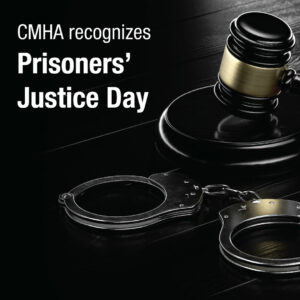CMHA North Bay and District joins individuals and organizations on August 10 in commemorating Prisoners’ Justice Day, a day to honour individuals who have died unnatural or violent deaths while incarcerated in correctional institutions. In addition to showing solidarity for those who have died while incarcerated, the day also brings attention to other socioeconomic impacts of incarceration, including the disproportionate representation of racialized and Indigenous communities in correctional facilities.
There is an overrepresentation of people with mental health and/or substance use issues in correctional custody across the province and across Canada. Mental illness rates are about four to seven times more common in correctional institutions than in the community, and research indicates that at least seven of 10 incarcerated individuals in the federal correctional system have engaged in problematic use of alcohol and other drugs during the one-year period prior to their incarceration.
CMHA supports Ontario’s prohibition on placing individuals with mental health issues in segregation and works closely with the Ministry of the Solicitor General to ensure the quality of care for Ontarians with mental health and/or substance use issues in provincial correctional facilities continues to improve.
CMHA Ontario and our branches are members of the Human Services and Justice Coordinating Committee (HSJCC) Network, which works to improve outcomes for individuals with complex human services needs who interact with the criminal justice system. <<Insert information about your local HSJCC network if applicable>>
In addition, CMHA Ontario recommends that mental health and addictions training be provided for all correctional personnel. Many CMHA branches across the province already offer these training workshops as part of our public education mandate, and we welcome the opportunity to partner with correctional facilities to provide these educational opportunities to correctional personnel.
The Provincial HSJCC also supports mandatory training on human rights and systemic racism, as well as de-escalation and use of force. Given the high proportion of individuals in segregation who identify as Black, Indigenous, or another racialized group, this training will be important in understanding the barriers for this population in accessing mental health treatment and support.
For more information about the HSJCC, visit hsjcc.on.ca. Learn more about the history of Prisoners’ Justice Day here.

